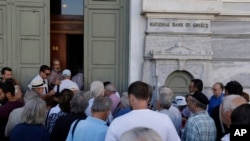Debt-wracked Greece reopened its banks Monday for the first time in three weeks, while also increasing taxes and making critical loan payments to two of its international lenders.
Depositors swarmed into banks to tap their accounts. Three-week-long restrictions were eased, but withdrawals were still limited to a one-time-a-week amount of up to $455 instead of the daily $65 withdrawals from streetside cash machines that the government required as it negotiated terms of new austerity-for-bailout terms with its creditors.
Greek consumers and tourists also faced 13 to 23 percent higher taxes on a series of consumer goods, including coffee, restaurant meals, taxis and ferries to Greek islands. The levies were part of a new austerity plan that Greece was forced to accept in order to reopen talks with the lenders on a $93 billion bailout, which would be its third in five years.
Greece also faced more than $6.5 billion in loan payments Monday to two of its creditors, the European Central Bank and the International Monetary Fund. But Athens was able to make the payments after securing more than $7 billion in temporary financing last week from an emergency European fund, in effect getting a new loan to pay other loans.
Once it is repaid the more than $2 billion it is owed, the Washington-based IMF said it "stands ready to continue assisting Greece in its efforts to return to financial stability and growth."
In Athens, embattled Greek Prime Minister Alexis Tsipras faces new parliamentary challenges this week, as his administration seeks approval of the new wave of reforms demanded by European creditors in exchange for more loans.
The pro-government newspaper Avgi called Wednesday's vote a "crash test" for the ruling Syriza party that could determine whether the Tsipras government survives or whether the prime minister is forced to resign.
The Tsipras coalition holds 162 seats in the 300-member parliament. But in a pivotal vote last week on new spending cuts, only 123 coalition lawmakers supported the measures, just three votes more than necessary to sustain a minority government.






